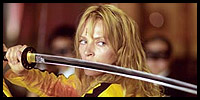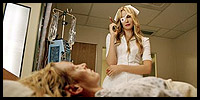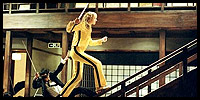
 |
|
Kill Bill: Volume One (2003) Cast: Uma Thurman, Lucy Liu, Vivica A. Fox, Sonny Chiba, Julie Dreyfus, Chiaki Kuriyama, Daryl Hannah, Michael Madsen, David Carradine, Michael Parks, Gordon Liu, Jun Kunimura, Kazuki Kitamura, Akaji Maro, The 5, 6, 7, 8's 2003 – 108 minutes Rated: Reviewed by Dustin Putman, October 11, 2003.  It has been six arduous years since his last feature film (1997's "Jackie Brown"), but masterful writer-director Quentin Tarantino proves he hasn't lost a thing with "Kill Bill: Volume One," a sumptuous, poetic, beautiful, graphically violent, startlingly innovative, balls-to-the-wall ode to the martial arts/spaghetti western/revenge genres. The film may get inspiration from other B-movies that have come before it, but it is guaranteed no one has ever seen a motion picture quite like this one.
It has been six arduous years since his last feature film (1997's "Jackie Brown"), but masterful writer-director Quentin Tarantino proves he hasn't lost a thing with "Kill Bill: Volume One," a sumptuous, poetic, beautiful, graphically violent, startlingly innovative, balls-to-the-wall ode to the martial arts/spaghetti western/revenge genres. The film may get inspiration from other B-movies that have come before it, but it is guaranteed no one has ever seen a motion picture quite like this one.
 In her meatiest big-screen role since Tarantino's "Pulp Fiction" in 1994, Uma Thurman inhabits every last inch of a no-nonsense ex-assassin known only as "The Bride" or "Black Mamba." On her wedding day four and a half years ago, her husband-to-be was brutally murdered, her unborn child sacrificed, and she herself was shot in the head and left for dead—all by the hands of her Assassination Squad, headed by Bill (David Carradine) and followed by O-Ren Ishi/"Cottonmouth" (Lucy Liu), Vernita Green/"Copperhead" (Vivica A. Fox), Budd/"Sidewinder" (Michael Madsen), and Elle Driver/"California Mountain Snake" (Daryl Hannah). When "The Bride" finally awakens from her coma, she has a single thing on her mind: revenge against those that have wronged her. Accordingly, she sets out to track them down and kill them one by one. Her first two targets: O-Ren Ishi, a hired assassin residing in Tokyo, and Vernita Green, now a married mother in Pasadena, California.
In her meatiest big-screen role since Tarantino's "Pulp Fiction" in 1994, Uma Thurman inhabits every last inch of a no-nonsense ex-assassin known only as "The Bride" or "Black Mamba." On her wedding day four and a half years ago, her husband-to-be was brutally murdered, her unborn child sacrificed, and she herself was shot in the head and left for dead—all by the hands of her Assassination Squad, headed by Bill (David Carradine) and followed by O-Ren Ishi/"Cottonmouth" (Lucy Liu), Vernita Green/"Copperhead" (Vivica A. Fox), Budd/"Sidewinder" (Michael Madsen), and Elle Driver/"California Mountain Snake" (Daryl Hannah). When "The Bride" finally awakens from her coma, she has a single thing on her mind: revenge against those that have wronged her. Accordingly, she sets out to track them down and kill them one by one. Her first two targets: O-Ren Ishi, a hired assassin residing in Tokyo, and Vernita Green, now a married mother in Pasadena, California.
 "Kill Bill: Volume One" includes all of the beloved hallmarks of a Quentin Tarantino film, from pitch-perfect dialogue that enlivens the characters and vibrates off the screen, to its multilayered storyline that is meticulously told out of chronological order. Here, though, Tarantino one-ups himself from a stylistic standpoint with a series of suspense-ridden, spectacularly violent action sequences that are crafted with more flawlessly vicious glee, airtight editing, and aesthetic know-how than anything in 2003's "The Matrix Reloaded." Excluding Paul Thomas Anderson (2002's "Punch-Drunk Love"), there is no filmmaker working today as savvy about music as Tarantino, ingeniously incorporating its every cue with remarkable precision and for maximum impact.
"Kill Bill: Volume One" includes all of the beloved hallmarks of a Quentin Tarantino film, from pitch-perfect dialogue that enlivens the characters and vibrates off the screen, to its multilayered storyline that is meticulously told out of chronological order. Here, though, Tarantino one-ups himself from a stylistic standpoint with a series of suspense-ridden, spectacularly violent action sequences that are crafted with more flawlessly vicious glee, airtight editing, and aesthetic know-how than anything in 2003's "The Matrix Reloaded." Excluding Paul Thomas Anderson (2002's "Punch-Drunk Love"), there is no filmmaker working today as savvy about music as Tarantino, ingeniously incorporating its every cue with remarkable precision and for maximum impact.
 The action setpieces are inevitable highlights, but far exceed expectations. The butcher knife battle between "The Bride" and Vernita Green in Vernita's suburban home is off-kilter, to the point, and, in its final moments, alternately sickening and perversely funny. Saving the biggest showstopper for last, however, is the climactic House of Blue Leaves battle against an entire army of guards, followed by the fight to the death with O-Ren Ishi amidst an idyllic, snowy nighttime landscape. These elongated scenes, gloriously brought to life by Sally Menke's faultless editing and Robert Richardson's (2002's "The Four Feathers") visually astounding and detailed cinematography. Richardson deserves an Oscar nomination for this, the best-looking film of the year.
The action setpieces are inevitable highlights, but far exceed expectations. The butcher knife battle between "The Bride" and Vernita Green in Vernita's suburban home is off-kilter, to the point, and, in its final moments, alternately sickening and perversely funny. Saving the biggest showstopper for last, however, is the climactic House of Blue Leaves battle against an entire army of guards, followed by the fight to the death with O-Ren Ishi amidst an idyllic, snowy nighttime landscape. These elongated scenes, gloriously brought to life by Sally Menke's faultless editing and Robert Richardson's (2002's "The Four Feathers") visually astounding and detailed cinematography. Richardson deserves an Oscar nomination for this, the best-looking film of the year.
 In addition, writer-director Quentin Tarantino throws in a smorgasbord of other unexpected treats and in-jokes for audiences in the know, including an awe-inspiring anime sequence detailing the history of O-Ren Ishi; black-and-white photography, its one technical credit that fails to mesh well; boundless, over-the-top blood and guts; intentionally jarring musical cuts; and even a visible string attached to the model airplane supposedly carrying "The Bride." Daryl Hannah's haunting whistle of Bernard Herrmann's "Twisted Nerve," only for the source material to transform into the score of the entire scene, and the indelible use of Japanese pop band The 5, 6, 7, 8's, are also noteworthy.
In addition, writer-director Quentin Tarantino throws in a smorgasbord of other unexpected treats and in-jokes for audiences in the know, including an awe-inspiring anime sequence detailing the history of O-Ren Ishi; black-and-white photography, its one technical credit that fails to mesh well; boundless, over-the-top blood and guts; intentionally jarring musical cuts; and even a visible string attached to the model airplane supposedly carrying "The Bride." Daryl Hannah's haunting whistle of Bernard Herrmann's "Twisted Nerve," only for the source material to transform into the score of the entire scene, and the indelible use of Japanese pop band The 5, 6, 7, 8's, are also noteworthy.
 In the performance arena, Uma Thurman appears in nearly every major scene and has rarely, if ever, been so radiant onscreen. Boasting untamable willpower, athleticism, humor, and an unshakable sadness, Thurman truly impresses. As O-Ren Ishi, the product of a tragic childhood who does not hesitate to chop the heads off of anyone who refers negatively to her Japanese-American heritage, Lucy Liu (2003's "Charlie's Angels: Full Throttle") sparkles with not a whole lot of screen time. The same goes for Vivica A. Fox (2002's "Juwanna Mann") as assassin-turned-housewife Vernita Green. As for the rest of the Assassination Squad, David Carradine, Daryl Hannah (2003's "Casa de los Babys"), and Michael Madsen (2003's "My Boss's Daughter") are only passingly glimpsed; "The Bride" will be seeking revenge on them in "Volume Two."
In the performance arena, Uma Thurman appears in nearly every major scene and has rarely, if ever, been so radiant onscreen. Boasting untamable willpower, athleticism, humor, and an unshakable sadness, Thurman truly impresses. As O-Ren Ishi, the product of a tragic childhood who does not hesitate to chop the heads off of anyone who refers negatively to her Japanese-American heritage, Lucy Liu (2003's "Charlie's Angels: Full Throttle") sparkles with not a whole lot of screen time. The same goes for Vivica A. Fox (2002's "Juwanna Mann") as assassin-turned-housewife Vernita Green. As for the rest of the Assassination Squad, David Carradine, Daryl Hannah (2003's "Casa de los Babys"), and Michael Madsen (2003's "My Boss's Daughter") are only passingly glimpsed; "The Bride" will be seeking revenge on them in "Volume Two."
 Which leads me to the one unfortunate, woefully unnecessary misstep that "Kill Bill: Volume One" holds, but could have easily avoided. Tarantino's past films—namely, "Pulp Fiction" and "Jackie Brown"—clocked in at over 2 1/2 hours. The sprawling, epic work that is "Kill Bill" was written as one complete motion picture, and would have been right at home in the midst of Tarantino's longish, ambitious predecessors. Facing a running time of over three hours, however, Miramax Films and Tarantino agreed to splice the story in half and release it as two separate releases ("Volume Two" is due out in April 2004). Unlike "The Lord of the Rings" trilogy, where each film has a definitive beginning, middle, and end leading up to a grander tapestry, "Kill Bill: Volume One" is frustrating in that it is needlessly only half of a movie. Breaking it into two parts was a cheap studio ploy, mistrusting of audiences' patience and financially greedy, to boot. Imagine going to see a movie, getting involved in it, and then, midway through, the projector breaks and the screening is abruptly canceled. The experience of watching "Kill Bill: Volume One" is akin to this.
Which leads me to the one unfortunate, woefully unnecessary misstep that "Kill Bill: Volume One" holds, but could have easily avoided. Tarantino's past films—namely, "Pulp Fiction" and "Jackie Brown"—clocked in at over 2 1/2 hours. The sprawling, epic work that is "Kill Bill" was written as one complete motion picture, and would have been right at home in the midst of Tarantino's longish, ambitious predecessors. Facing a running time of over three hours, however, Miramax Films and Tarantino agreed to splice the story in half and release it as two separate releases ("Volume Two" is due out in April 2004). Unlike "The Lord of the Rings" trilogy, where each film has a definitive beginning, middle, and end leading up to a grander tapestry, "Kill Bill: Volume One" is frustrating in that it is needlessly only half of a movie. Breaking it into two parts was a cheap studio ploy, mistrusting of audiences' patience and financially greedy, to boot. Imagine going to see a movie, getting involved in it, and then, midway through, the projector breaks and the screening is abruptly canceled. The experience of watching "Kill Bill: Volume One" is akin to this.
 There is no doubt in my mind "Kill Bill: Volume Two" will be anything less than a satisfying conclusion to a narrative that, when watched in its entirety, will become a modern cinematic masterpiece. Judging "Kill Bill: Volume One" on its own, it is a marvel of strikingly original action setpieces and tight plotting, surrounded by a visual lyricism difficult to translate into words. Equally difficult to explain is Quentin Tarantino's sheer talent, far surpassing even heavyweights like Steven Spielberg and Martin Scorsese. Tarantino is the real deal, a cinema lover and force to be reckoned with whose every frame is more than worth your time—even when half the frames are missing.
There is no doubt in my mind "Kill Bill: Volume Two" will be anything less than a satisfying conclusion to a narrative that, when watched in its entirety, will become a modern cinematic masterpiece. Judging "Kill Bill: Volume One" on its own, it is a marvel of strikingly original action setpieces and tight plotting, surrounded by a visual lyricism difficult to translate into words. Equally difficult to explain is Quentin Tarantino's sheer talent, far surpassing even heavyweights like Steven Spielberg and Martin Scorsese. Tarantino is the real deal, a cinema lover and force to be reckoned with whose every frame is more than worth your time—even when half the frames are missing.
|
© 2003 by Dustin Putman |














